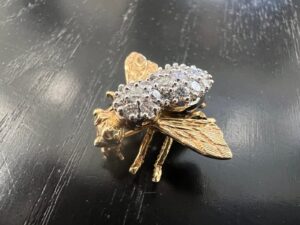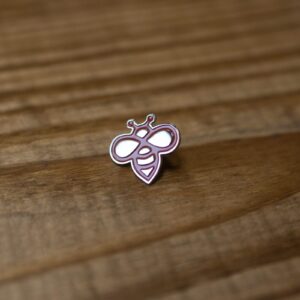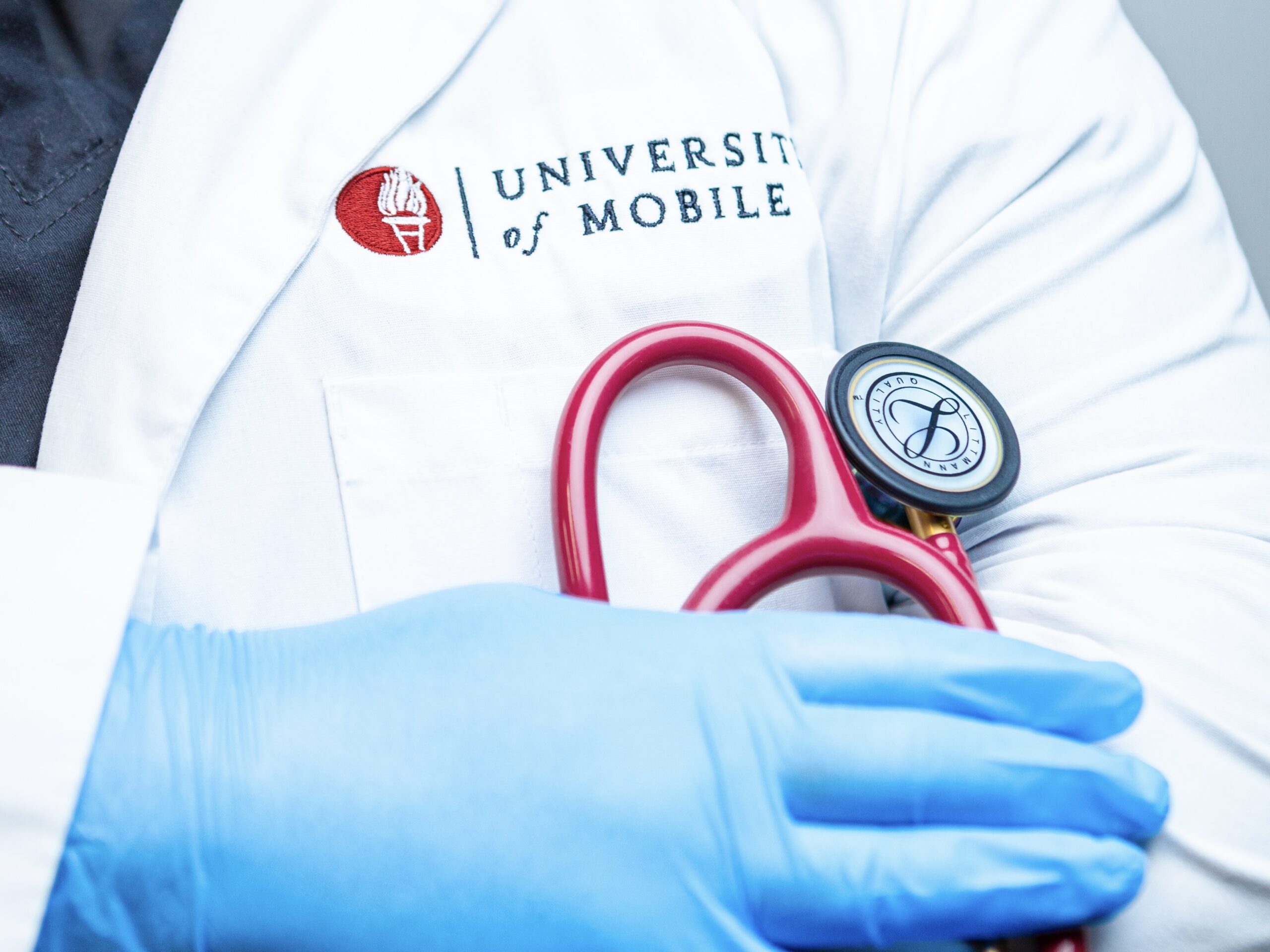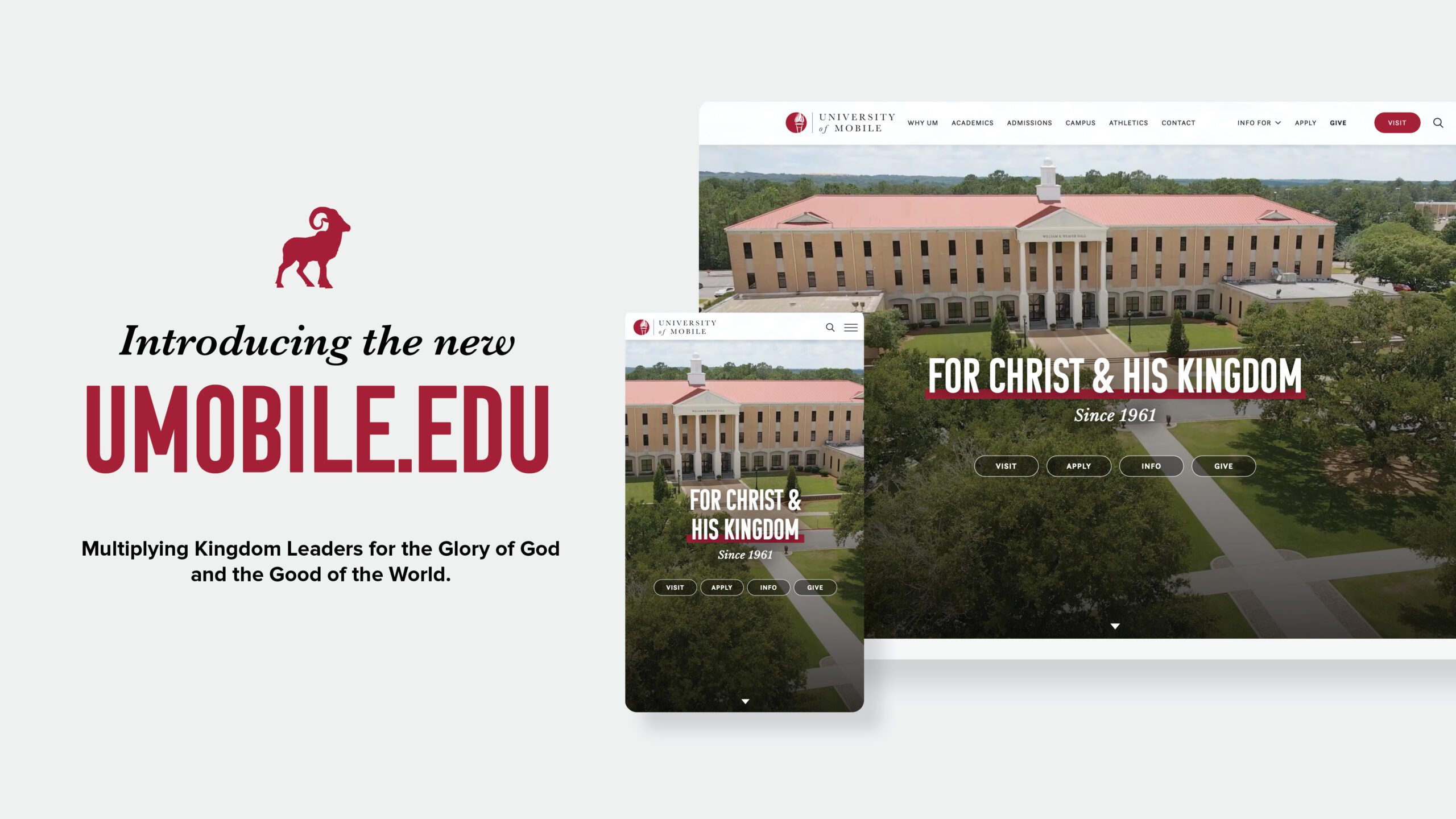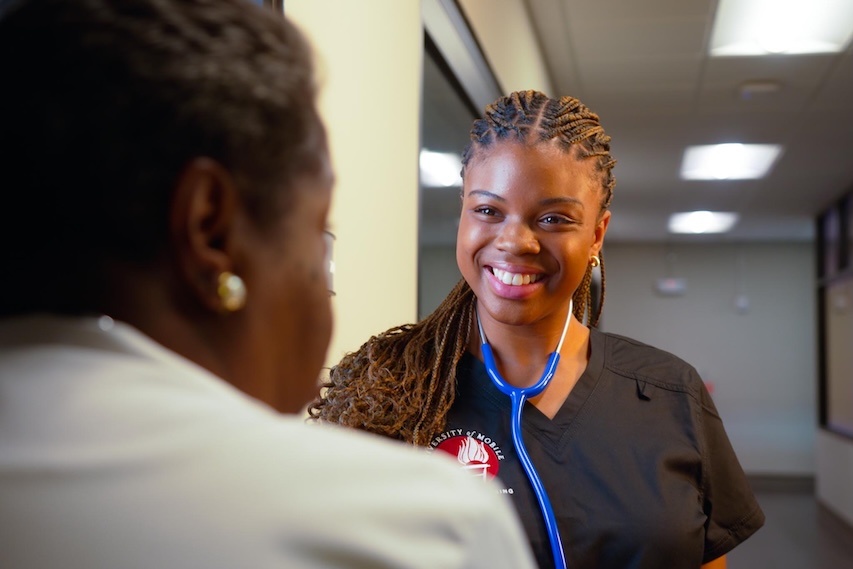The Woman Who Helped Build a College: B Weaver and the University of Mobile
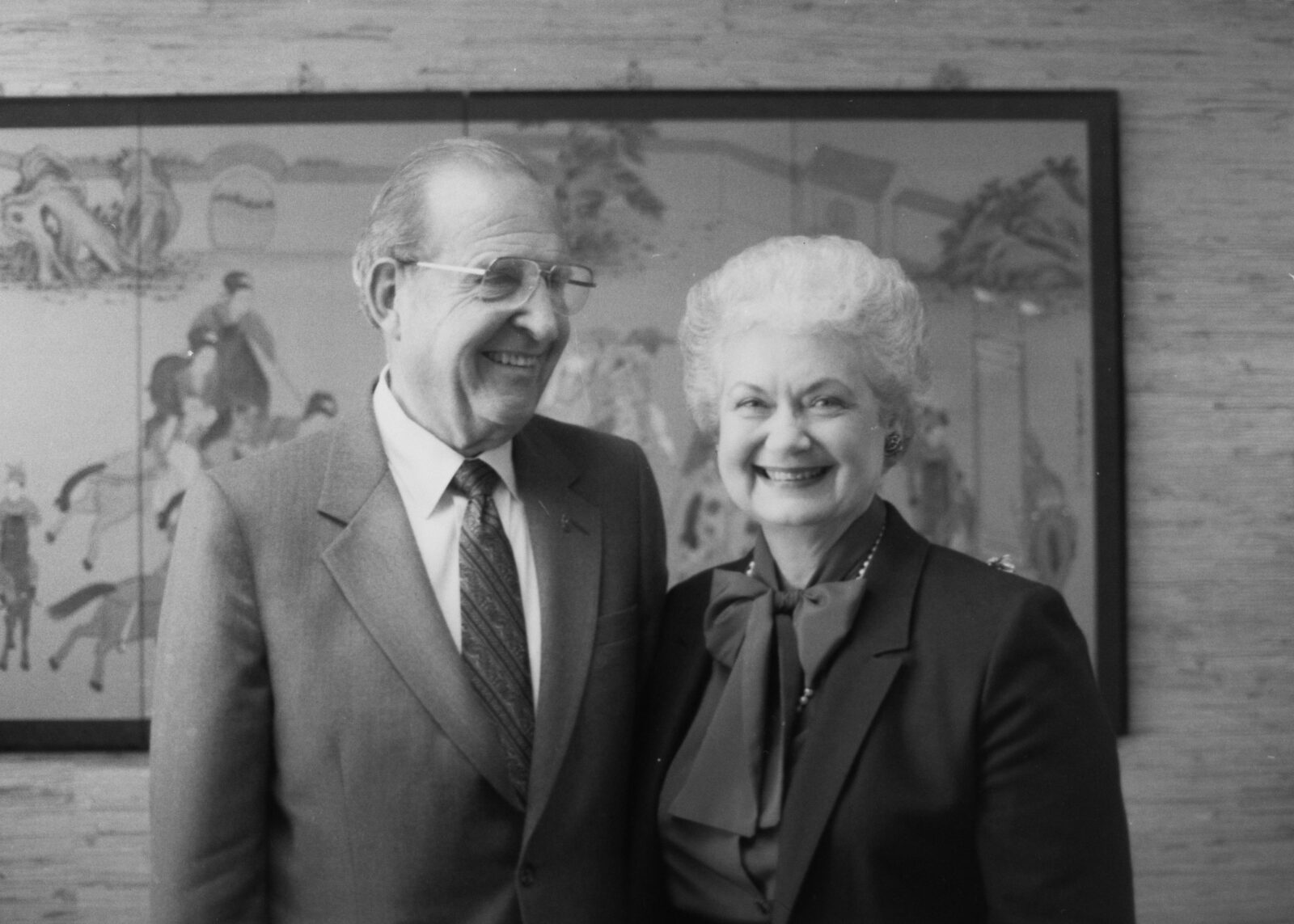
MOBILE, Ala. – The first thing you noticed about Annie Boyd Parker Weaver was her beautiful smile. The second was the bee-shaped gold and diamond pin that always rested atop her left shoulder. A gift from her husband in honor of her nickname – “B” – the pin also served as a reminder of how this gracious southern lady helped build a Baptist college.
The first “First Lady” of Mobile College, now the University of Mobile, was always “busy as a bee” using her talents of hospitality, compassion and leadership.
The story of B Weaver and her husband, Dr. William K. Weaver Jr., is the love story of a lifelong partnership. Together, they “have truly been the cornerstone upon which this college was founded and built,” said Board of Trustee Chairman T. Massey Bedsole when Dr. Weaver retired in 1984 after 23 years as college president.
The Weavers are gone now – B died in 2008 and Bill followed in 2014. But travel down Pollock-Altmayer Drive and you’ll see his name on the university’s signature building – William K. Weaver Hall. And walk across campus and you’ll feel her influence in the friendly faces and welcoming environment that make this Christ-centered academic community “the UM family” where students are known.
His story has been told often – how on April 1, 1961, he became the founding president of a college that he would jokingly recall “had no land, no buildings, no faculty, no students – and no problems.” How that college was chartered on Dec. 12, 1961, and opened its doors to the first freshman class on Sept. 9, 1963. How today, with alumnus Dr. Lonnie Burnett as its 5th president, the University of Mobile is awarding bachelor’s, master’s and doctoral degrees to students from across the world.
B’s story has been told less often – but her impact is just as great.
This is her story.
In the 2003 book, “Golden Wisdom for Today’s Woman: Treasured Portraits of Faith” by author Barbara Sims, B shared how God prepared her for her life’s work.
Born April 17, 1920, Annie Boyd Parker grew up in Talladega, Alabama, where she was called “Annie B.” She didn’t like being called “Annie,” so as a student at Alabama College for Women, now University of Montevallo, she shortened it to “B.”
“A Christ-centered upbringing, early church experiences, her college days, and working in the secular world during World War II are all factors B recognizes today as God’s way of preparing her for a life of service,” Sims wrote.
In 1945 when she was in her late 20s, B was hired as Baptist Student Union director at Alabama College. About that same time, Howard College, now Samford University, hired Weaver in a similar position on that campus. He had also grown up in Talladega and was the big brother of B’s close friend.
Their work brought them together at conferences, and Weaver soon made it a point to stop by Montevallo to visit B on his travels throughout the state. They married on Nov. 4, 1948, in Montevallo Baptist Church.
“A deep love exists between the two of us. We have always had an assurance that we were meant to be together,” B told Sims.
Soon the couple faced a challenge – a tumor in B’s spinal column required surgery with the possibility she would never walk again. The surgery was a success, but the radiation that followed created a concern whether the couple could have children.
Then, in 1950, Weaver was called as pastor of First Baptist Church in Sylacauga, Alabama.
“God blessed us as we followed His will. You cannot imagine our almost unbelievable excitement when tests confirmed my pregnancy. A precious baby daughter, our only child, was born nine months after our move to Sylacauga. We named her Anne,” said B.
The 10 years in Sylacauga were rewarding and happy years, wrote Sims. Then God called the couple to Mobile, Alabama.
They answered “Yes.”
Weaver was serving as chairman of a committee appointed by the Alabama Baptist State Convention to study the possibility of establishing a new Baptist college in Mobile. When the Sylacauga pastor was approached in 1961 about becoming the founding president of the college, the first thing he did was go home and talk to B about it.
“We prayed about it, and said I would give it a try,” he recalled in a 2011 interview.
Reflecting on that moment when announcing his retirement in 1984, Weaver said, “When B and I considered this opportunity, we agreed that if we measured up to the challenge, it would likely require the rest of our career years and all that we could give to this effort during those years. We both sought to fulfill this commitment and have worked together as a team, each trying to complement the efforts of the other.”
As Bill worked on developing the academic programs, constructing buildings, recruiting students and raising funds, B worked on building the university community. She served as hostess for university events, where her eye for beauty, love of flowers and willingness to “use a little elbow grease to have things right” made every moment special.
“B’s commitment to do her best was a commitment to her Savior,” Sims wrote. B told her, “Whatever I did, I wanted it to be special for Him.”
She looked for opportunities to bring people together and build community. When the school was three years old, she started the tradition of “The Remembrance Tree.” Each year, a Christmas tree would be decorated with ornaments from members of the college faculty and administrative staff that commemorate special moments in their lives or reflect their academic discipline or personality. That tradition continues today.
A Powerful Force
She harnessed a powerful force in the community – wives of Mobile’s business and community leaders. In an era where career opportunities for women were limited to roles such as homemakers, secretaries, teachers and nurses, organizations such as the Mobile College Auxiliary provided an opportunity for women to lead and make an impact.
The Mobile College Auxiliary was born on April 10, 1964, when B invited about 200 women to campus. Representing the greater Mobile community and various religious denominations, they came to campus to form an organization to serve the college and students and be a connecting link between the school and the community.
The Auxiliary was active for 30 years, raising funds through an annual Tasting Party and meeting monthly for coffees featuring speakers on topics such as the economic future of Mobile. Annual projects ranged from campus beautification and purchasing robes for the college choir to furnishing the college’s Willie Mae Lewis Lyon Missionary Home that housed Southern Baptist missionaries on furlough.
A primary focus was providing scholarship assistance to students, which they presented yearly. In 1987, the Mobile College Auxiliary Endowed Scholarship was established, which is now the Annie Boyd Parker Weaver Endowed Scholarship.
Today, the University of Mobile’s most prestigious award given each year to a graduating female senior is the Annie Boyd Parker Weaver Excellence Award. Selection is made by a secret vote of the faculty based on scholarship, Christian character, leadership and service.
B made a difference.
Patience. Wisdom. Warmth. Gentle strength. Gracious presence. Leadership through service.
These characteristics made B a welcomed ambassador for good throughout the Mobile community. She served on the boards of organizations such as Mobile Opera, Mobile Mental Health Association and the Historic Mobile Preservation Society.
She was one of the first two women to be made an Honorary Member of the Rotary Club of Mobile in the days before the organization started admitting female members in 1989.
A member of First Baptist Church of Mobile since the Weavers arrived in the city in 1961, she served as a trustee and on numerous church committees. She was president of the Association of Alabama Baptist Ministers’ Wives and served on the board of the Florence Crittenton Home for unwed mothers.
Meant to Be
B’s enthusiasm for the college remained contagiously genuine throughout her life, wrote Sims in “Golden Women.”
“This institution was meant to be,” B told Sims. “When Bill was named president, I knew it was my role to support him and be a part of this new endeavor. We saw miracles happen here.”
Look at the photographs from those early years of Mobile College, and it’s easy to see the love – and the partnership – the Weavers shared. His face lights up when he looks at her. Her eyes are on him when speaks.
At Dr. Weaver’s funeral in 2014, six years after B had passed away, then-UM President Mark Foley pictured their heavenly reunion.
“I can just imagine B with a demure smile upon her lovely face and Bill with his broad, ready smile and a twinkle in his eyes as B looked him over and reached up to straighten his tie just so.
“And I can imagine B saying to him, ‘Oh Bill…come, let me show you. There is so much more for you to see.’”
(EDITOR’S NOTE: As a tribute to B Weaver, the University of Mobile Store has created the B’s Bees pin. Proceeds from the sale of B’s Bees pins fund scholarships for UM students through the Annie Boyd Parker Weaver Endowed Scholarship.)
About the University of Mobile
The University of Mobile is a Christ-centered liberal arts and sciences institution with a vision of higher education for a higher purpose, founded to honor God by equipping students for their future professions through rigorous academic preparation and spiritual transformation. Core values are: Christ-Centered, Academically-Focused, Student-Devoted and Distinctively-Driven. The university offers on-campus and online bachelor’s, master’s and doctoral degrees in over 75 academic programs. Founded in 1961, the University of Mobile is affiliated with the Alabama Baptist State Convention and is located 10 miles north of Mobile, Alabama on a campus of over 880 acres.
For information about the University of Mobile, areas of study, admissions and more, visit umobile.edu, connect with UM on social media @univofmobile, or call Enrollment Services at 1.800.WIN.RAMS or 251.442.2222.
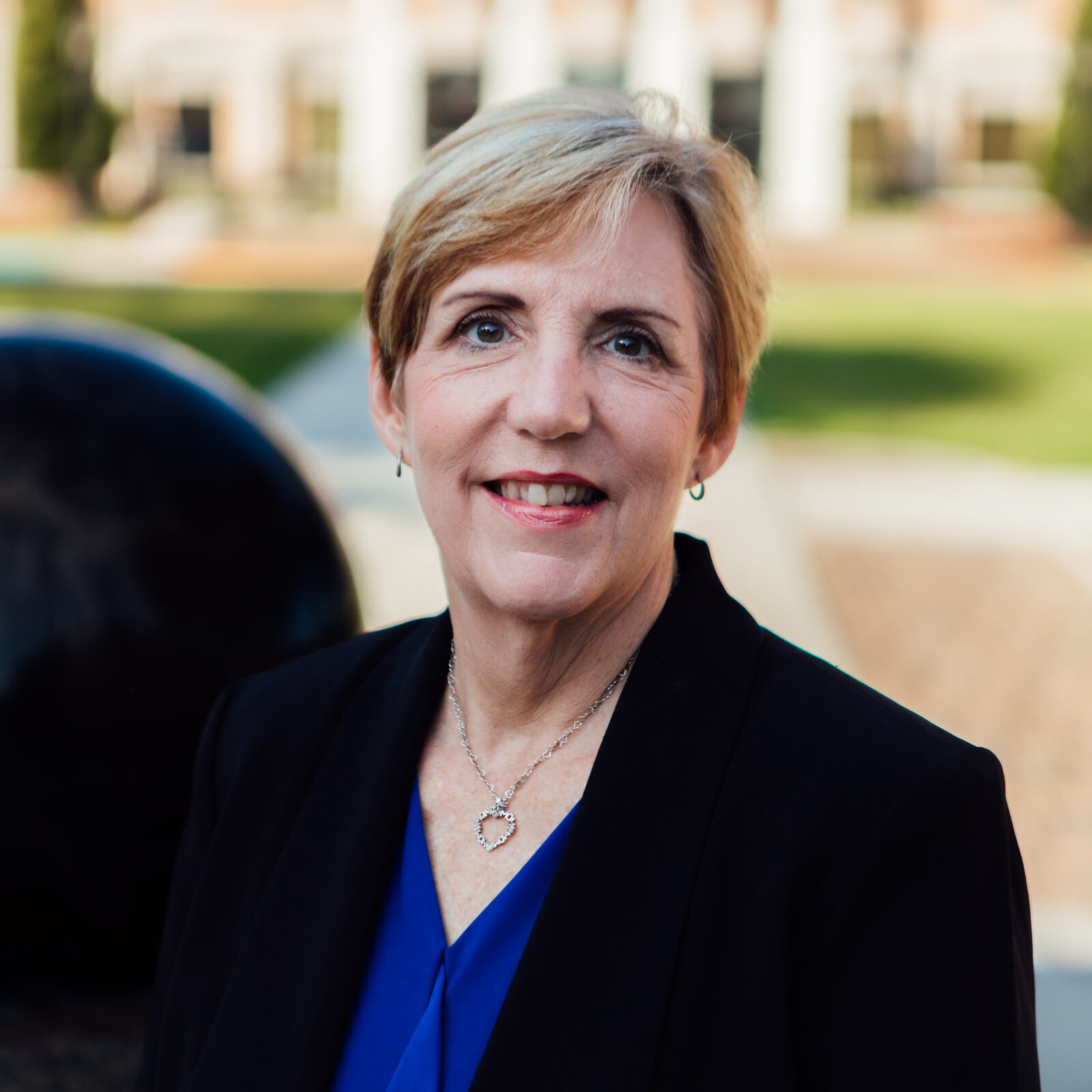
Kathy Dean uses her passion for storytelling and “playing with words” to share the stories of people, place and purpose that make the University of Mobile unique. As associate vice president for university communications, she manages media relations, edits the TorchLight alumni magazine, and oversees university communications. A former award-winning journalist, she is a two-time recipient of the Baptist Communicators Association grand prize for feature writing. Kathy and her husband, Chuck, live with three extremely loud miniature schnauzers.

